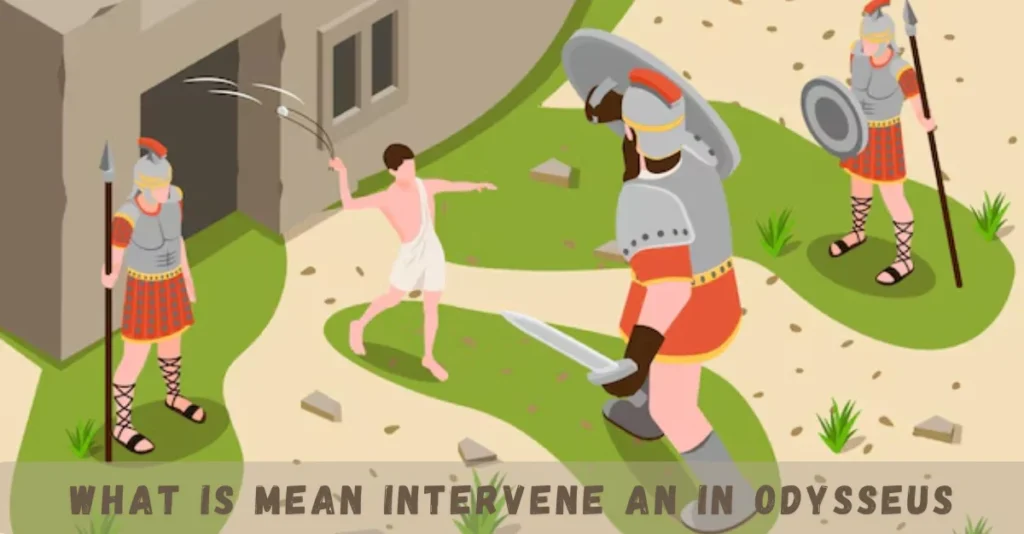Introduction to the Odyssey and its significance
The Odyssey, an epic poem attributed to Homer, has captivated readers for centuries. This timeless tale follows the heroic journey of what is mean intervene an in odysseus as he navigates treacherous waters, encounters mythical creatures, and faces numerous trials on his quest to return home after the Trojan War. But what makes this story so compelling? One key element is the concept of intervention—an idea that plays a significant role in shaping Odysseus’ fate.
So what does ‘intervene’ mean in relation to this legendary voyage? As we dive into the depths of Odysseus’ adventures, we’ll explore how various characters step in at crucial moments. These interventions not only affect his path but also reflect broader themes about fate, free will, and divine influence. Join us as we unravel these fascinating layers within The Odyssey!
Explanation of the term ‘intervene’ in relation to the story
The term ‘intervene’ plays a pivotal role in the narrative of Odysseus. It denotes a disruption or alteration in the course of events, often instigated by external forces. In this epic tale, divine beings frequently interfere with human affairs.
From Athena’s guidance to Poseidon’s wrath, these interventions shape Odysseus’ journey. They highlight the tension between fate and free will. Each act of intervention serves as a catalyst that propels him forward or leads him astray.
In essence, to intervene means to step in where others might hesitate. This idea resonates through each trial faced by Odysseus. The gods are not mere spectators; they actively mold his experiences and decisions.
Understanding what it means to intervene adds depth to our interpretation of the story’s themes—power dynamics between mortals and deities are central to its fabric.
Examples of interventions in Odysseus’ journey
Throughout Odysseus’ journey, various interventions play critical roles in shaping his fate. One notable instance occurs when Athena, the goddess of wisdom, intervenes multiple times to guide him. Her support provides strategic insight and encouragement during dire moments.
Another significant intervention happens with Circe. After initially turning Odysseus’ men into swine, she ultimately aids them after he overcomes her enchantments. This unexpected alliance enhances their chances of survival as they continue their quest homeward.
Then there’s Hermes, who steps in to deliver vital messages. His guidance proves crucial when dealing with both Circe and Calypso, helping Odysseus navigate dangerous encounters effectively.
Poseidon’s interference demonstrates a darker side of divine intervention. His wrath complicates Odysseus’ return due to past grievances but also illustrates the constant push-and-pull between mortal actions and divine will throughout the epic saga.
The role of intervention in the overall theme and message of the Odyssey
Intervention plays a crucial role in the Odyssey, shaping Odysseus’ fate and experiences throughout his journey. The gods frequently intercede, influencing events that steer him closer to home or lead him astray.
Each intervention serves as a reminder of the delicate balance between human agency and divine will. Characters like Athena represent guidance and wisdom, often helping Odysseus navigate treacherous waters.
Conversely, other forces disrupt his path—like Poseidon’s wrath—showcasing how interventions can just as easily hinder progress. This duality highlights a significant theme: the unpredictability of life’s journey.
The various interventions reflect broader messages about destiny versus free will. They prompt readers to consider their own paths in life and the unseen influences at play every day.
Through these moments of divine engagement, Homer emphasizes resilience and adaptability as essential traits for overcoming obstacles on the quest for homecoming.
Other interpretations of ‘intervene’ in the context of the story
Intervention in the Odyssey can be viewed through various lenses. It’s not just about divine gods stepping in; it also reflects human actions and decisions. Odysseus himself intervenes at key moments, using wit and cunning to navigate challenges.
The interventions of lesser characters, like Penelope or Telemachus, add depth too. Their choices influence Odysseus’ fate from afar. This suggests that intervention is a shared responsibility among all characters, highlighting collective agency.
Moreover, the concept of fate plays a significant role in interpreting these interventions. Are they truly changes orchestrated by free will? Or are they preordained path markers leading Odysseus home?
Such layers invite readers to ponder whether every action—divine or mortal—holds weight in shaping destiny within the epic’s tapestry. Each interpretation opens new avenues for understanding what it means to intervene and how those actions reverberate throughout the story.
Discussion on whether interventions helped or hindered Odysseus’ journey
Throughout Odysseus’ journey, interventions came from gods and mortals alike. Some of these moments were crucial for his survival.
Consider Athena’s guidance. Her support helped Odysseus navigate treacherous situations. Without her wisdom, he might not have outsmarted the Cyclops or escaped Circe’s enchantments.
Yet, not all interventions proved beneficial. Poseidon’s wrath often complicated his travels. His interference delayed Odysseus’ return home and intensified the challenges faced at sea.
The blend of divine help and hindrance illustrates a complex relationship with fate and free will. Each intervention shaped Odysseus’ character, pushing him to evolve as a leader and warrior.
While some actions by deities aided his quest, others served as tests of resilience. This tension between assistance and obstruction defines much of what makes the Odyssey compelling. The outcome often hinged on how he responded to each challenge presented along the way.
FAQs
What does “intervene” mean in Odysseus’ journey?
In the context of The Odyssey, “intervene” refers to divine or mortal actions that disrupt or alter the course of Odysseus’ journey. Gods like Athena guide him, while others, like Poseidon, hinder his progress.
How do the gods intervene in Odysseus’ journey?
The gods intervene in various ways, such as Athena offering guidance, Circe aiding him after a struggle, and Poseidon hindering his path. These interventions shape his fate and experiences, emphasizing the role of divine influence.
What role does intervention play in The Odyssey?
Intervention highlights the tension between fate and free will. Gods frequently influence Odysseus’ journey, either helping or obstructing him, which reflects broader themes of destiny, resilience, and adaptability in the epic.
How did Poseidon’s intervention affect Odysseus’ journey?
Poseidon’s intervention was primarily negative, hindering Odysseus’ progress due to his anger over past actions. His wrath caused delays, adding complexity to Odysseus’ quest and underscoring the unpredictable nature of divine influence.
Can interventions in The Odyssey be seen as helpful or harmful?
Some interventions, like those from Athena, were crucial for Odysseus’ survival and success. Others, like Poseidon’s, complicated his journey. The balance of help and hindrance reflects the story’s central themes of fate, free will, and growth.







